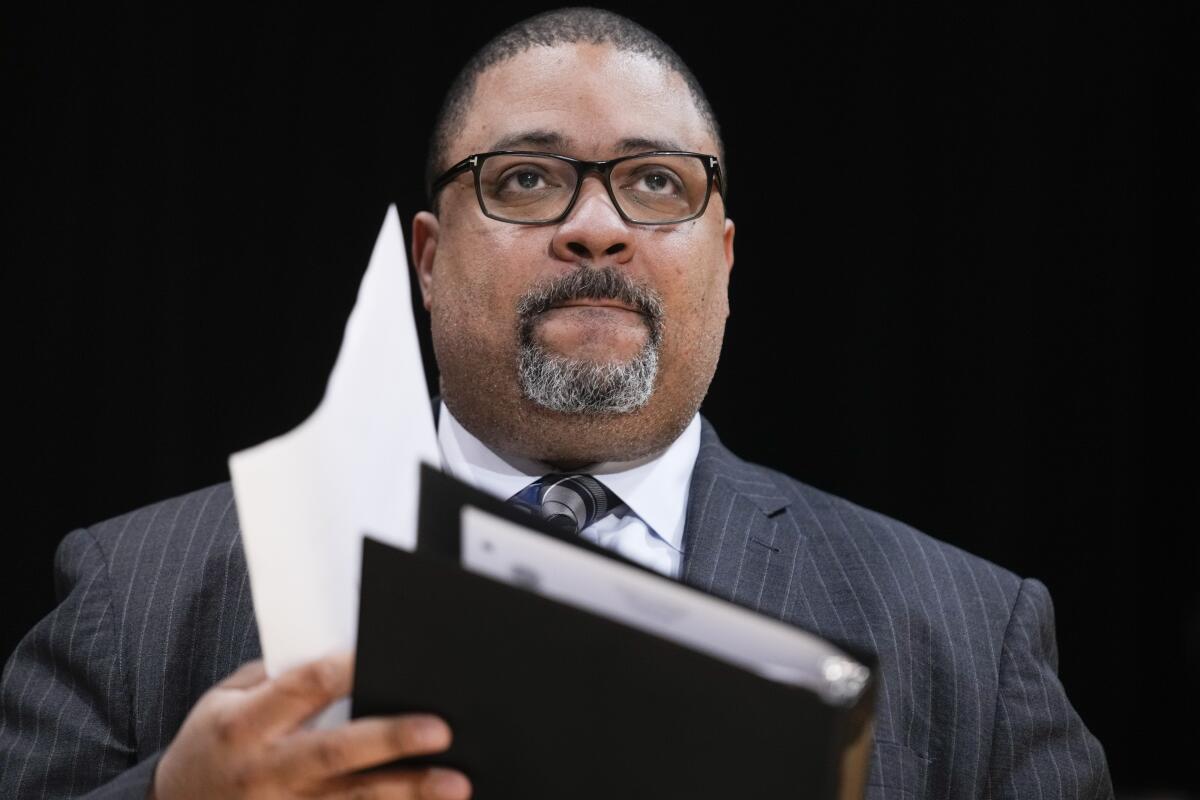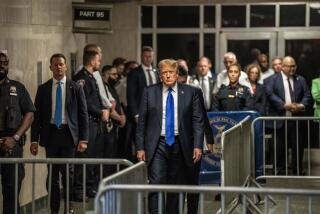Trump’s indictment is a historic first. Here’s why more are likely to follow

- Share via
The news that a Manhattan grand jury has returned an indictment of Donald Trump — the first criminal charge against a former president in the nation’s history — is monumental in itself. We should pause for a moment to appreciate the giant step that Manhattan Dist. Atty. Alvin Bragg has taken toward accountability for a man who has shown nothing but contempt for the rule of law.
But Thursday’s announcement also ushers in a new normal that will be among the most strange and stressful periods in America’s legal and political annals. The charges in the New York case, along with others likely to follow from Georgia and the federal government, will be caught up in a presidential campaign through which Trump is seeking vindication.
Trump’s instinct will be to put as much stress as possible on the prosecution and its prosecutors, claiming at every turn renewed proof of a political vendetta against him and his supporters. In recent months, he has exhorted his followers to see the charges as an attack on them and to see him as their salvation and retribution. This quasi-religious posturing will only intensify as trial dates approach.
Even in New York, new developments indicate that Bragg’s case goes beyond the scheme to pay hush money to Stormy Daniels. The 11th-hour appearance before the grand jury of David Pecker, a former chairman of the company that publishes the National Enquirer, suggests Bragg’s office was also looking into hush money paid to model Karen McDougal in a scheme that extended into Trump’s presidency. That could broaden the charges to a longer-running conspiracy to deceive and conceal, countering partisans who have attacked the Daniels case as insignificant.
Moreover, amid the speculation surrounding the Manhattan investigation in recent weeks, Special Counsel Jack Smith’s federal investigations took dramatic steps toward holding Trump accountable both for classified records discovered at his Mar-a-Lago estate in Florida and for the events surrounding the Jan. 6, 2021, insurrection. Meanwhile, in Fulton County, Ga., Dist. Atty. Fani Willis is investigating Trump’s related interference in the state’s 2020 election, which could well yield additional charges.
In the classified documents case, U.S. District Court Judge Beryl Howell ordered Trump lawyer Evan Corcoran to testify before a grand jury, agreeing with the Justice Department that his communications with Trump were not protected by attorney-client privilege because they may have been in furtherance of illegal storage of classified documents. Corcoran’s testimony could well form the centerpiece of a federal indictment of Trump in what looks to be a fairly straightforward and thoroughly investigated case.
Breakthroughs in the investigation surrounding the Jan. 6 insurrection were no less significant. Most notably, Smith won important rulings in the federal district court rejecting claims of privilege by former Vice President Mike Pence and Trump’s Chief of Staff Mark Meadows, both of whom have sought to avoid testifying.
The full and truthful testimony of those two men could devastate the former president. Meadows was neck-deep in almost all aspects of Trump’s post-election schemes and the closest eyewitness to Trump’s conduct on Jan. 6. Pence, meanwhile, was on the receiving end of Trump’s vitriolic efforts to strong-arm him into breaking the law.
We’re not yet at the end of the road with either former Trump lieutenant. The U.S. Court of Appeals for the District of Columbia has already rejected executive privilege arguments against providing such testimony on numerous occasions, and it can be expected to make quick work of Meadows’ claim here. But the former chief of staff may well choose to assert 5th Amendment protection against incriminating himself, leaving the Justice Department with a very difficult decision: whether to force his testimony against Trump by granting him immunity, which federal prosecutors are normally loath to do for such a culpable party.
Pence’s claim is more novel — though ultimately no more compelling. He has argued that the Constitution’s “speech or debate” clause, which shields members of Congress from reprisals for legislative conduct, immunizes him against testifying because the vice president serves as president of the Senate. Judge James “Jeb” Boasberg, the new chief judge of the U.S. District Court in Washington, ruled that the clause might shield Pence from testifying about his conduct in presiding over Congress’ certification of the 2020 election, but not from testifying about the conduct he witnessed as Trump’s vice president. In other words, it would not shield Pence from having to describe in great detail Trump’s campaign to force him to commit a crime.
After years of waiting for some response to Trump’s transgressions, Thursday’s historic development has a kind of “at last” feel. But in important ways, it’s only the first phase of an extended test of the system’s ability to deliver justice under uniquely difficult conditions.
Harry Litman is host of the “Talking Feds” podcast. @harrylitman
More to Read
A cure for the common opinion
Get thought-provoking perspectives with our weekly newsletter.
You may occasionally receive promotional content from the Los Angeles Times.










